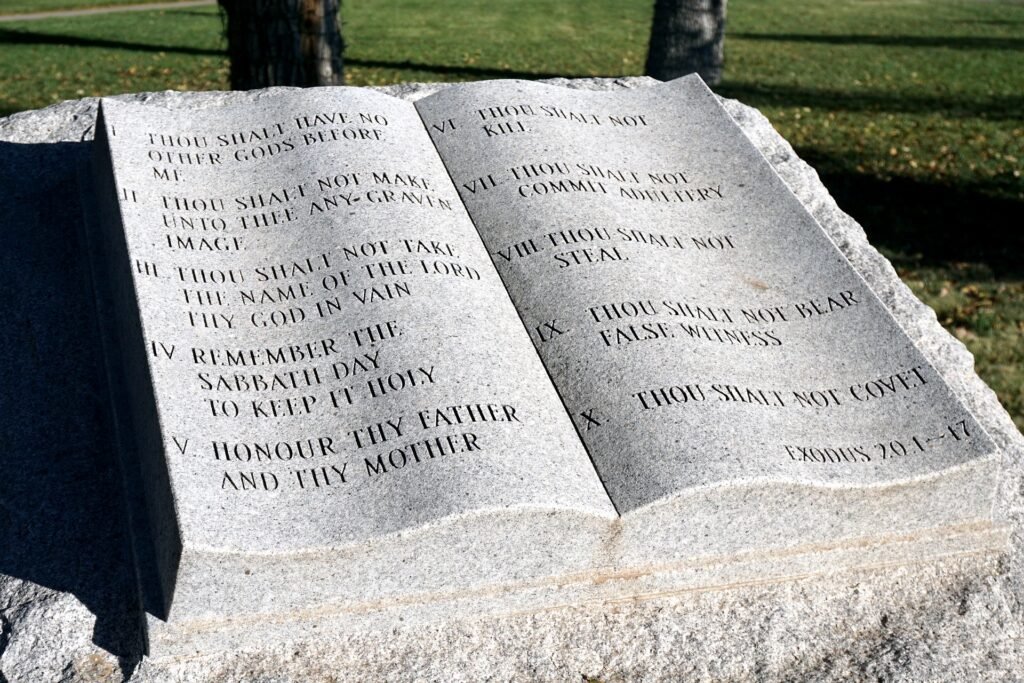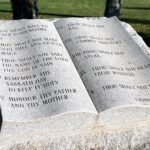TEN COMMANDMENTS
God gave us His commandments to follow and to obey Him. We can only obey and follow Him if we do what He tells us to do. During the last week of His life Jesus made obedience to His law very clear to the disciples and to all who follow Him. In John 14:15, 21-24 [KJV]. He said, “If ye love me, keep my commandments… He that hath my commandments, and keepeth them, he it is that loveth me: and he that loveth me shall be loved of my Father, and I will love him, and will manifest myself to him… If a man love me, he will keep my words: and my Father will love him, and we will come unto him, and make our abode with him. He that loveth me not keepeth not my saying: and the word which ye hear is not mine, but the Father’s which sent me.” It cannot be made any clearer, Jesus said to keep His commandments as this is how we love God and if you do not keep them you do not love God.
We will be taking a Biblical journey of the Ten Commandments. We will learn how to love God because of His Ten Commandments. We will see His creation is at the center of the Ten Commandments and our attitude of worshiping God is what is important to Him. Unfortunately, there are many religions and people who claim to love God but refuse to honor Him by obedience to His commandments. Those who do not obey Him and keep His commandments must then make up their own laws to keep. By making up their own laws to keep rather than obedience to God’s law, these people break the very first commandment. In our study we will see dozens of scriptures where Jesus and God tell us to keep His commandments. We will examine three verses used by those who do not want to keep God’s law which they use to dispute the keeping of the Ten Commandments. We will see all three verses promote God’s law and the keeping of the commandments. Using the principles of hermeneutics (See COSCOG7 Hermeneutics) we will learn to take scripture into Biblical and historical context and to let the Bible interpret the Bible. Finally, we will read a one page synopsis of each of the Ten Commandments.
In the end there can only be ONE conclusion from this study. God commands and wants us to keep and follow His Ten Commandments today even as Christians. In no scripture in the Bible from Genesis to Revelation are the Ten Commandments “done away with”. Obedience to God’s worshipping principles of the commandments is binding on us today.
Section one: The Ten Commandments as recorded by Moses are found in Exodus 20: 1-17 and in Deut. 5: 6-21. Amazingly and unknown to most people, the Ten Commandments can be found recorded in scripture before they were codified on Mount Sinai. “From the very beginning of humanity from the time of Adam and Eve to Moses the Ten Commandments were known of and kept by those who were considered righteous in God’s eyes. Sin, the transgression of the law (I Jn.3:4) was known and understood from the time of Adam and Eve as there can be no sin without law (Gen.2:2-3 The Sabbath, #4; Ex.16:30; Gen.9:22 Honor parents, #5; Gen 4:7-12 the murder of Abel, #6; Gen. 26:10 adultery, #7; 39:8-9 more adultery noted to be sin; 31:19 Stealing, #8; 12:11-13 Lying #9; 26:6-7 Lying; 25:29-34 Covet #10). These prior verses cover 9 out of ten of the Ten Commandments before Moses. We also see Noah was “righteous” and we know no one can be righteous without being obedient to God and His law. Gen. 6:8, 9, 22;7:1 and II Pet. 2:5 all speak of Noah as righteous before God. These are some examples of the law and the keeping of the law before Moses.
Moses and the law. It was in the time of Moses that the law was written down (Codified). We do not know if it had been written down before this time as Israel had spent 400 years in Egyptian slavery. We do know the law was inforce and obeyed by the righteous of God before Moses (see above). In Exodus 19 and 20 we see the events of the giving of the Ten Commandments on Mount Sinai. This law as recorded in the Torah was the basis for the covenant with the people of Israel (Ex.34:28). God said in Jere.31:31-33 that He would bring a new and better covenant to the people of God in the future but He did NOT do away with the Ten Commandments! (Read Jere.31:33 carefully-the law was to be put in our hearts-not done away but sealed into our hearts and minds as we obey God).” (Quoted from COSCOG7 The Ten Commandments). Most importantly, Abraham, the Father of the faithful kept God’s law! Gen. 26:5 “Because that Abraham obeyed my voice and kept my charge, my commandments, my statutes, and my laws”. Abraham was more than 400 years before Moses and the giving of the law on Mount Sinai.
Section two: Knowing God’s law was in force and kept from Adam to Moses is helpful but what about after Moses? We will now take a long journey through scripture showing God desires His commandments to be kept today. IT IS PARAMOUNT TO LOOK UP AND READ EVERY SCRIPTURE QUOTED IN THIS SECTION!
-Deut. 6:1-7 Right after repeating the Ten Commandments to Israel, Moses reminds Israel to keep all the law. Verse 2, “…fear the LORD thy God, to keep all his statures and his commandments…”
-Deut. 30:15-20 God sets before us life and death and asks us to choose life. How do we choose life? By keeping His commandments (see verse 16).
-Matt. 5:17-20 Jesus states emphatically He did not come to destroy the law but to fulfill the law. We will see in a later section the word “fulfill” as translated from the Greek means to fulfill what was prophesized, he would do. Jesus continues in verse 19 to say that any man that breaks even one of the least commandments will be called least in the Kingdom of Heaven.
-Matt. 19:16-21 Jesus is asked what good thing must be done to gain eternal life. Jesus answered by repeating commandments 5,6,7,8 and added “to love thy neighbor as thyself”. This exchange is also found in Mark 10:18-19.
-John 15:9-14 To abide in His love we must keep His commandments.
-Hebrews 8:6-10 Under the new covenant God will write his laws on our hearts. The law of God is not only NOT put aside but it is engraved on our minds and in our hearts!
Romans 8:3-9 The “righteousness of the law” (vs.4). Those who obey the law are spiritually minded and those who disobey the law are carnally minded and cannot inherit the Kingdom of God.
-John 14:15, 21, 23 “If you love me, keep my commandments”.
-Deut. 10:12-17 What is required of us? Vs. 13, Keep the commandments because God created everything and He is so great and powerful and wonderful and mighty and terrible that to not obey Him is unfathomable.
-Deut. 4:1-2 Do not add or take away from which God commanded as we must “keep the commandments of the LORD your God…”
-Deut. 4:25-32 God outlines the terrible and negative consequences of not obeying Him, but He holds out hope of forgiveness and rescue to His people. In verse 32 and 35 He again reminds us of His creation and His mighty power.
-Deut. 5:29 Keeping the commandments should be from our heart not from some misguided legalism. Read again John 14:15-23.
-I John 2:1-6 This epistle of the Apostle John was written in the 90’s A.D. approximately 60 years after the death of Christ and near the end of the apostle John’s life. John, the apostle Jesus loved, the closest friend of Jesus when they walked together on earth is still keeping the Ten Commandments and telling others to also keep the commandments! Verse 3 and 4, “And hereby we do know that we know him, if we keep his commandments. He that saith, I know him and keepeth not his commandments, is a liar, and the truth is not in him”. If anyone does not keep the commandments of God, they are a liar and the truth is NOT in them!!!
-I John 3:4 “Whosoever committeth sin transgresses also the law: for sin is the transgression of the law”. We only know of sin because of God’s law.
-I John 3:22-24 “And whatsoever we ask, we receive of him, because we keep his commandments…”
-I John 5:3 “For this is the love of God, that we keep his commandments: and his commandments are not grievous”. Wow, to have God’s love we must keep His commandments.
-Ecclesiastes 12:13-14 “Let us hear the conclusion of the whole matter: Fear God and keep his commandments: for this is the whole duty of man.” It is our entire lifetime duty to keep God’s commandments.
-Pro. 7:1-3 Solomon tells his son (children) to keep his commandments and to bind them on their hearts. This is exactly what God tells us to do.
-Rom. 2:13 To be justified by God we must do the law.
-Rom. 3:31 Faith does not void the law it establishes the law.
-Rom. 6:23 “The wages of sin is death but the gift of God is eternal life.” We know sin is the transgression of the “law” (I John 3:4). To have eternal life we must keep the law and not sin (break the law).
-Rom. 7:7 “Is the law sin? God forbid. Nay, I had not known sin, but by the law…”
-Rom. 13:8-10 How do we love? How is the law fulfilled? We learn love and show love to our fellow man by keeping the law of God. “Thou shalt not commit adultery, Thou shalt not kill, Thou shalt not steal, Thou shalt not bear false witness, Thou shalt not covet…” (verse9).
Section 3: We have so far seen God’s commandments were kept before Moses. God wrote them down for Moses to give to the children of Israel as they had been in captivity for 400 years and needed to be reminded of God’s law. Jesus and the disciples kept them during the life of Jesus and Jesus Himself said we show our love for Him by keeping the commandments. In Luke 24:44 Jesus said, “These are the words which I spake unto you, while I was yet with you, that all things must be fulfilled, which were written in the law of Moses, and in the prophets, and in the Psalms, concerning me.” Jesus is pointing out He kept the law and He fulfilled every prophecy of Him. At the very end of His life just before His ascension to Heaven, He reminds His followers who He is and what He did. Yet there are those who believe just a few weeks later the apostles were out preaching the law of God is done away with. Do NOT believe these people, as we read in I John 1:3-4, “They are liars and the truth is not in them.”
Using the principles of hermeneutics we will let the Bible interpret itself, we will go from the easily understood to the difficult and look at the words and the cultural contexts of three verses used by those who believe God’s law is done away. We will see in the end these three verse promote and uphold God’s law and the Ten Commandments.
–Matt. 5:17-19 “Think not that I am come to destroy the law, or the prophets: I am not come to destroy, but to fulfil. 18For verily I say unto you, Till heaven and earth pass, one jot or one tittle shall in no wise pass from the law, till all be fulfilled. 19Whosoever therefore shall break one of these least commandments, and shall teach men so, he shall be called the least in the kingdom of heaven: but whosoever shall do and teach them, the same shall be called great in the kingdom of heaven.” There are those who say Jesus “fulfilled” the law for us thus we do not have to keep the law. This is not at all what this verse in inferring. First, we will look at context and the Greek word translated “fulfilled”. Strong’s #4137 “pleroo” means, “to fulfill, make full, to be filled, full, complete (often used with the reference to the fulfillment of the OT scriptures”. Jesus in His own words is simply stating He fulfilled all the prophecies of Him in the Old Testament and He faithfully obeyed the law. This verse in Matthew 5:17-19 can in no way imply the law is done away with.
Secondly, let us allow the Bible to interpret itself. Matt. 5:18 For verily I say unto you, Till heaven and earth pass, one jot or one tittle shall in no wise pass from the law, till all be fulfilled. Note: The world and the heavens are still here therefore according to the direct words of Jesus the law is still here to be obeyed!! 19Whosoever therefore shall break one of these least commandments, and shall teach men so, he shall be called the least in the kingdom of heaven: but whosoever shall do and teach them, the same shall be called great in the kingdom of heaven.” Jesus was not speaking in past tense; He was speaking of the FUTURE. His statement would make zero sense if He was referring to the past, therefore from that moment on anyone who would break even the least of the commandments would be called least in the Kingdom of Heaven. The only conclusion of Matt. 5:17-19 is the commandments are still in force and to be kept today.
–Galatians 3:10-13, “For as many as are of the works of the law are under the curse: for it is written, Cursed is everyone that continueth not in all things which are written in the book of the law to do them. 11But that no man is justified by the law in the sight of God, it is evident: for, The just shall live by faith. 12And the law is not of faith: but, The man that doeth them shall live in them. 13Christ hath redeemed us from the curse of the law, being made a curse for us: for it is written, Cursed is every one that hangeth on a tree:” There are those who use these verses in Galatians to say God’s law is a curse on those who keep it. Concerning the word “cursed” in verse 10 we will let the Bible interpret itself. The “curse “of the law is the death penalty from breaking the law (Rom. 6:23) and Gal. 3:10b says, “Cursed is every one that continueth not in all things which are written in the book of the law to do them. The curse comes from NOT keeping the law! Those who do not keep God’s law will die, this death is the curse of the law.
Colossians 2:14-17 is often used to say God’s law was nailed to the Cross and we no longer need to obey God. We will now look at these verses one by one to see what they do say.
Col. 2:14 Blotting out the handwriting of ordinances that was against us, which was contrary to us, and took it out of the way, nailing it to his cross; What “ordinances” are being referred to and what was nailed to the cross? The Greek word translated for “ordinance” (Strong’s #1378) is “dogma” meaning “decree”, or “regulation”- not law. This has nothing to do with the Ten Commandments and everything to do with the rules, regulations and traditions of men added by the Jewish religious leaders over the previous 1500 years. Jesus completely condemns the Jewish religious leaders over this in Matthew 23. Over and over again in Matthew 23 Jesus says “Woe unto you Pharisees, hypocrites…” What was “nailed to the cross”? As stated in verse 14 the “ordinances” were nailed to the cross. These same man-made rules and regulations were nailed to the cross, not the Ten Commandments. This is made clear in verses 20-21. In verse 20 the word translated “ordinance” is the Greek word “dogmatizo” (Strong’s #1379), a slightly different word than “dogma” meaning “to submit to rule, regulation, subject to ordinances.” It is man’s rules that were nailed to the cross not God’s laws.
15And having spoiled principalities and powers, he made a shew of them openly, triumphing over them in it. 16 Let no man therefore judge you in meat, or in drink, or in respect of an holyday, or of the new moon, or of the sabbath days: There are some who say to not keep the Sabbath and Holy Days. Paul shows they were keeping them and Christians should not allow themselves to be judged for keeping God’s laws and Holy Days. 17 Which are a shadow of things to come; but the body is of Christ. The Sabbath and Holy Days give us a glimpse of the future Kingdom of God.
We should now easily see and understand we are to continue in God’s love by keeping His Ten Commandments. We have seen several dozen verses commanding us to keep the commandments. We have learned a better more accurate understanding of the three verses used to try to annul the law. Each one of these verses promote the keeping of the commandments.
Section 4 – The Ten Commandments are God’s covenant with mankind.
Understanding the basics of God’s covenant with Israel is also important to our understanding of the Ten Commandments. Some folks will argue the commandments were only given to Israel and thus have no sway or importance on our behavior today. Paul address this in Rom. 11: 13-27. We learn the gentiles are graffed (graffed is old English, today we say “grafted”) INTO Israel and become a part of the Inheritance of Israel. In verse 26 he says “All Israel shall be saved” this includes Jew and Gentile as the gentiles are now a part of Israel’s blessings. Verse 27 Paul says, “For this is my covenant unto them, when I shall take away their sins”.
-Ex.24:7-8 All the people agree to keep the law, and Moses sprinkles the blood of the covenant upon them. The Ten Commandments are the covenant.
-Ex. 34:28c “…And he wrote upon the tables the words of the covenant, the Ten Commandments.”
-Ex. 32:15-16 Who wrote on the tables of stone? God did! The commandments were written by the very hand of God Himself.
The original covenant with Israel was written by God into stone and we have been told ever since to keep and obey what God wrote!
-Jeremiah 31:31-33 We learn God will create a New Covenant not because the first covenant was bad but because the people were flawed (Heb.8:8). The people sinned and did not obey the “covenant” which we know is the Ten Commandments. What will the difference be between the New and the Old Covenant? God says in verse 33c “I will put my law in their inward parts, and write it in their hearts…” Under the new covenant the spiritually begotten of God will have His Holy Spirit within them thus allowing for His law to be on their hearts.
Jere. 31:31 Behold, the days come, saith the LORD, that I will make a new covenant with the house of Israel, and with the house of Judah: 32 Not according to the covenant that I made with their fathers in the day that I took them by the hand to bring them out of the land of Egypt; which my covenant they brake, although I was an husband unto them, saith the LORD: 33 But this shall be the covenant that I will make with the house of Israel; After those days, saith the LORD, I will put my law in their inward parts, and write it in their hearts; and will be their God, and they shall be my people. We see the fulfillment of the prophecy of Jere. 31:31-31 in Hebrews 8:10 where it is repeated that God will put His law on our hearts.
Our study has now shown God’s law (Ten Commandments) have been in existence and known to man since the beginning of human creation. There are dozens of Bible verses stating we should still keep the Ten Commandments and no place in the Bible says the Ten Commandments are done away with. Now we can delve one by one into each of the wonderful God commanded laws He so lovingly gave to us.
FIRST COMMANDMENT
“Thou shalt have no other gods before me.”
Who is this “Me” of Ex. 20:3? It is God making a plain and simple statement about His authority over not only His creation but His authority over us, His human creation. Only God has the authority to make decisions as to what is right and what is wrong. Every time we sin it is because we have lifted ourselves up to the level of God to make decisions as to what is right and what is wrong. So, who is “me” that makes these life and death decisions concerning us, His creation?
God made all (Gen. 1:1; John 1:3; Job 38 all). God and Jesus are both God (John 1:1-4). (See COSCOG7 Deity for more information about God and Jesus.) God is both almighty and sovereign (Rev. 4:8; 16:7; Gen. 17:1). God is eternal (I Tim. 1:17; Deut. 33:27; Psalm. 41:13; 90:2b). God is omnipresent invisible spirit (John 4:24; Psalm. 139:7-10; Jere. 23:24) and no one has ever seen God the Father (John 1:18; I Tim. 1:17). God is Holy (Rev. 4:8; Lev. 19:2; Isa. 6:3; Luke 1:49). God is self-existent; He always has been and always will be (Ex. 3:14). God is all loving (John 3:16; Rom. 5:8; Eph. 1: 4, 7; I John 2:1-2). God is one God (Deut. 6:4; 4:35; 32:39; II Sam. 7:22).
This is the “me” of Ex. 20:3. This is the God we worship. We are to have “no other god’s” before Him. He is so powerful and omnipotent that He alone is God and there is none like Him.
Biblical history shows us Lucifer attacked God in heaven and tried to make himself God. We can read about this in Isa. 14:12-14 and Ezek. 28:13-17. (See COSCOG7 Man Satan Sin Death for further details). Lucifer thought so highly of himself that he attacked God’s throne and tried to make himself “like God”. Lucifer wanted to be God. Lucifer’s attitude of self-centeredness and pride is what he uses today to get us to sin. Lucifer wanted to decide what was right and wrong. He wanted to make the decisions only God is qualified to make. Every time we sin it is because we have justified ourselves to our decision as to what is right and what is wrong. This is exactly what Lucifer did, thus God’s very first commandment, “Have no other gods before me” is a warning to us to obey and keep His commandments. It is God’s commandments and statutes and laws that show us His will as to what is right and wrong. It is not up to us to make decisions of right and wrong. Every time we humans lift ourselves up to decide right from wrong, we are following in the footsteps of Satan- we are doing exactly what Satan did. We are raising ourselves up to the level of God as if we are god’s to make decisions. We are worshiping ourselves and our decisions rather than following God and His laws.
The very first human sin recorded in Gen.3:6 we see Adam and Eve deciding for themselves what is right and what is wrong. The serpent (Lucifer) was able to convince them as he had convinced himself to make their own decisions apart from God. This breaking of the first commandment has led to a history of mankind from Genesis through Revelations of horrendous suffering for all mankind. All this sin and suffering because Lucifer persuades us to decide right from wrong for ourselves apart from the wisdom of God.
Sin is the “transgression of the law” (I John 3:4). No matter which commandment of God we break we do so after deciding right from wrong, we always break the first commandment when we sin.
Why did God start His ten commandments with “Have no other gods before me”? Because this was the very first sin of Lucifer. Lucifer wanted to be God himself (Isa. 14 and Ezek. 28 mentioned above). We are not equal with God. Only God is qualified to make the moral decisions of what is right from wrong. Following God’s law is the only way not to break the first commandment.
Second Commandment
Exodus 20:4-6 “Thou shat not make unto thee any graven image, or any likeness of anything that is in heaven above, or that is in the earth beneath, or that is in the water under the earth: Thou shalt not bow down thyself to them, nor serve them: for I the LORD thy God am a jealous God, visiting the iniquity of the fathers upon the children unto the third and fourth generation of them that hate me; And shewing mercy unto thousands of them that love me, and keep my commandments.“
God’s second great commandment flows seamlessly from the first. After God tells us to have “no other god’s before Him” he tells us not to make “any graven image” or bow down and worship that image. While the first commandment is mental, raising ourselves up to the level of God to make decisions of what is considered morally right and wrong, the second commandment is physical. We will not with our own physical hands build our own god’s out of stone or any physical substance. The second commandment is also spiritual in that we are not to even envision graven images.
What is a “graven image”? It is any image carved of wood or stone for the purpose of worshipping it. The graven image becomes a false image (replacement) for the true God. We do NOT bow down and worship these images in any way or we sin against God. God is a “jealous” God (Deut. 4:24; 32:16). We are only to worship Him! For those who do worship false god’s the punishment for that family will go to the third and fourth generation (Note: Historically, families lived together as clans, often to the fourth generation). For those who love God or repent of worshiping false gods, God will show mercy to those who “Keep my commandments”.
Deut. 4:1-31 shows us a wonderful example of this second commandment. God starts the chapter by telling us to live by His commandments, statutes and judgements. He tells us how He destroyed all the men who followed Baalpeor (a false god made of stone). He teaches us his statutes and judgments and tells us to keep them. Starting in verse 16 he says, “Lest ye corrupt yourselves, and make you a graven image…” He continues on in verse 23 saying not to forget His covenant (The Ten Commandments were the covenant of God (Ex. 34:28)) or… Verses 24-31 He says, “I call heaven and earth to witness against you this day, that ye shall soon utterly perish from off the land whereunto ye go over to Jordan to possess it.” Through verse 31 God continues to describe what will happen to those who worship gods made from wood or stone. As in Ex. 20:6 God promises mercy and life to those who repent, do not worship false gods and keep His Ten Commandments. The spiritual aspect is to keep these false gods from our heart.
We see a tremendous example of the consequences of worshiping false gods made of stone or wood in Gen 31. Jacob secretly flees from Laban with his wives and family to go back to Isaac, his father. Laban pursues Jacob to retrieve his daughters and his goods. In fact, Laban lied about why he pursued Jacob. Laban pursued for a very specific reason, to retrieve his own personal graven image gods (Gen. 31:30). In this one chapter we see many of the Ten Commandments broken: Rachel was a thief and a liar. Laban worshiped false gods and was willing to kill for them. Respect and honor were not given to Laban the father. Rachel coveted her father’s false gods. Laban was willing to destroy Jacob and steal away all of Jacob’s belongings to retrieve his idols. Worshiping graven images, making our own rules of right and wrong leads to the breaking of the Ten Commandments. Worshiping graven images is a sin (I John 3:4) and is punishable by death.
We see that God is very serious about us not worshiping false gods. We are only to worship God Almighty otherwise He will destroy us and wipe us from the face of the earth. He is a “Jealous” God. He is jealous that we only worship Him! Graven images are not gods; they are false gods created to keep us from worshiping the true God of the universe. God demands our exclusive devotion, and He will tolerate no other gods.
Third Commandment
Ex. 20:7 “Thou shalt not take the name of the LORD thy God in vain; for the LORD will not hold him guiltless that taketh his name in vain.”
This third great command from God seamlessly follows the first two commands. 1. Have no other gods before me and 2. Thou shalt not make any graven images. The first command God shows us his awesome greatness. The second command he tells us not to make false gods out of wood or stone, and He is a Jealous God wanting ALL of our worship. The third commandment gives us respect and humility towards God because of His awesomeness. God is all powerful, we are weak. God is omnipotent, we are mortal. Our vanity is worthless in comparison to God Almighty and His supreme universe ruling power. We are not to use God’s name (names) lightly and in any insignificant way. God is so great and so very wonderful that we must RESPECT Him at all times and HUMBLE ourselves before Him at all times. We must understand the first two commandments before we can do this. Making light of His name and using such words or phrases as GD this, OMG that etc. is disrespectful to God and shows an acute lack of humility on our part. We are nothing compared to God; thus we must rid ourselves of all our vanity and only worship God.
The third commandment is truly about RESPECT of God and His total awesome existence and our HUMILITY towards Him in this human existence of ours. The Hebrew word “vain” used in Ex. 20:7 means “worthlessness”. We are worthless and God is worth all. God is worth so much that He was willing to die for our salvation (John 3:16) and only He could do this. We should not ever make light of Him!
We keep from taking God’s name in vain by our humility to Him and by understanding our human pride and vanity is worthless. God wants a humble and contrite heart from us (Isa. 66:2; 57:15). All human activity is vanity to God (Eccl. 1:2). Pride comes before a fall (Pro. 16:18-19). Our pride will bring us low (Pro. 29:23). We must have the attitude of a child towards our God (Matt. 18:4). If we exalt ourselves as Satan did, we will be abased. If we humble ourselves as Christ did, we shall be exalted (Matt. 23:12). God resists the proud but gives grace to the humble and we must humble ourselves to Him (James 4:6, 10). Humble ourselves before God so that He may exalt us (I Pet. 5:5-6). Humble ourselves before God as we worship Him in spirit and in truth. Never belittle God or casually throw His name around; by doing so we will be found guilty of disrespect to the Almighty Sovereign God and suffer the fate of the sinful (Ex. 20:7b). If we fake knowing God and only claim to follow Him, we are living a life of vanity and we are guilty of breaking third commandment seriously. “Not everyone who says to Me, ‘Lord, Lord,’ shall enter the kingdom of heaven, but he who does the will of My Father in heaven. 22 Many will say to Me in that day, ‘Lord, Lord, have we not prophesied in Your name, cast out demons in Your name, and done many wonders in Your name?’ 23 And then I will declare to them, ‘I never knew you; depart from Me, you who practice lawlessness!’” It is possible to live a life believing we have honored Jesus and yet it was a life of vanity because we did not keep His Ten Commandments.
How powerful is God? How humble must we be? We can read exactly of His great power and of the humility He requires of us in the book of Job. From Job 37:1 through Job 42:6 we read the most amazing story where God Himself describes His greatness to Job. God did this to crush the vanity out of Job. As God describes how he framed the universe and created all creatures we can see and feel Job was becoming smaller and smaller in his own eyes, as we should become smaller in our own eyes in comparison to God. For a moment we see Job begin to understand in Job 40:3-5 but God once again continues explaining His own greatness to Job. Finally, Job understands God. We read his remarkable words in Job 42:1-5. “Then Job answered the LORD, and said, I know that thou canst do everything, and that no thought can be withholden from thee. Who is he that hideth counsel without knowledge? Therefore, have I uttered that I understood not; things too wonderful for me, which I knew not. Hear, I beseech thee, and I will speak: I will demand of thee and declare thou unto me. I have heard of thee by the hearing of the ear: but now mine eye seeth thee. Wherefore I abhor myself, and repent in dust and ashes.” Job finally understood respect and humility towards God.
What are we compared to God? Nothing. God’s remarkable description of His great power to Job should give us all time to pause, to humble ourselves and to respect God. The third commandment is all about our respect and humility to God because He is truly all powerful and omnipotent and we are as nothing. He is too awesome to use His name in vain.
The Forth Commandment
Ex. 20:8-11 “Remember the Sabbath day, to keep it holy. Six days shalt thou labour, and do all they work: But the seventh day is the Sabbath of the LORD thy God: in it thou shalt not do any work, thou, nor thy son, nor thy daughter, thy manservant, nor thy maidservant, nor thy cattle, nor thy stranger that is within thy gates: For in six days the LORD made heaven and earth, the sea, and all that in them is, and rested the seventh day: wherefore the LORD blessed the Sabbath day, and hallowed it.”
God has shown us in the first three commandments that He is all powerful, the creator and is so omnipotent that we should have no other gods before Him, nor make any false gods from wood or stone and never to use His great name lightly. The first three commandments show us God’s greatness and how His power and majesty is so great we should all fall down and worship Him. Flowing seamlessly from the first three commandments, the fourth commandment follows this theme and teaches us how to worship Him.
Now that we know His power and majesty we must indeed fall down and worship Him, thus He gave us the Sabbath day which He calls “holy”. We are told to “remember” the Sabbath day as it was already in force (Ex.16:24-31 as an example and the creation week where God rested on the seventh day Gen. 2:1-3). The Sabbath is a special sign between God and His people (Ex. 31:12-17). We are not to work on the Sabbath day (Ex. 20:9-10; Deut. 5: 12-14; Ex. 35:2-3 (Note: Work means to earn a living: See Strong’s #4399). Everybody gets a day off to rest and most importantly worship God. Why is the Sabbath day so important? God tells us why the importance of the Sabbath in Ex. 20:11. He “made heaven and earth, the sea and all that in them is…” With the Sabbath day God is continuing His theme of the first three commandments: His total omnipotence as creator of all there is. He is reminding us we must fall down and worship Him because of who He is and what He created. He gives us the Sabbath day as a weekly reminder of His power and glory. This emphasis on His creative power is repeated three times in this commandment using the word, “LORD” in verses 9 and 11. This word LORD is YHWH in Hebrew, otherwise called Yahweh. Strong’s # 3068 says YHWH is, “the proper name of the one true God; knowledge and use of the name implies personal or covenant relationship; the name pictures God as the one who exists and/or causes existence- the LORD”. The Sabbath day is about us understanding God and all His powerful and creative nature and of His holiness. He is for us to worship because of what He has done.
The Sabbath day is the first of His Holy Days of worship (Lev. 23: 2-3; Deut. 5:12-15). We keep the Sabbath day because God the creator ordained it. As God rested on the seventh day and abstained from His work we must rest on the seventh day and abstain from our daily work (income earning as we saw in Ex. 35-2-3). God created the universe and all that is in it in six days, we must stop our daily lives and give honor to God for His magnificent creation on the seventh day. No one has the authority to change the Sabbath day to any other day because only God created the universe and all that is in it.
Mark 2:27 [NKJV] “And He said to them, “The Sabbath was made for man, and not man for the Sabbath.” God gave His children a gift. A gift of love and kindness. A gift of time to worship and enjoy Him and the family (Brethren) He is calling and working with. Who are we to throw away the gift God gave to us?
We have now covered the first four commandments which show us how powerful and wonderful God is and why we should worship Him. Jesus was asked “…which is the great commandment in the law? Jesus said unto him, Thou shalt love the LORD thy God with all thy heart, and with all thy soul and with all thy mind. This is the first and great commandment. And the second is like unto it, Thou shalt love thy neighbor as thyself. On these two commandments hang all the law and prophets” (Matt. 22:36-40). We love God first (He is omnipotent) and our neighbor second (mortal beings) but we should love our neighbor like we love God. This summary of the law by Jesus gives us the dividing point of the Ten Commandments. The first four show how we love and worship God and the last six, with the transition of the fifth (Honor your parents) show us how to love our neighbor.
Fifth Commandment
Ex. 20:12 Honour thy father and thy mother: that thy days may be long upon the land which the LORD thy God giveth thee.
This fifth commandment of God is the first commandment with a promise: long life (Eph. 6:2). We see the command repeated in Deut. 5:16 and Matt.15:4 with an addition. If we keep this commandment of God we will have a long life, if we fail to keep it, we will “die the death”. The plain truth is if we do not honor our parents, we will die the eternal death (See COSCOG7 Immortal Soul).
This fifth commandment is a transition command from our obedience to God the creator to the loving of our fellow mankind. If everybody were to keep the fifth commandment there would never be a need for the last six commandments. If we honor and obey God, we would not be sinful and hurtful to our fellow humans. Jesus pointed this out in John 15:10-12.
Honoring your mother and your father goes both ways. We often think of this command as children honoring parents. It is true children should honor their parents but like God the parents must also be honorable. This commandment is much deeper than having physical children honor their parents. Only God deserves honor as he is creator. Once again, we see a seamless flow from one commandment to the next all tied in with God’s creation. While children honoring their parents is one perspective of this commandment, it leaves out the greatest perspective. God is our Father, He created us and the universe and He is deserving of our honor. Additionally, we created our children and like God he asks our children to honor us, as we honor Him, as parents are the creators of their children. Once again, a commandment based on the creation of God and all its glory and majesty. Every one of the Ten Commandments shows how great God’s creation is. Why would we ever even consider breaking His law? We need to look at the fifth commandment from three separate points of view.
First, from the parent’s point of view. If we truly want our children to honor us, we must teach them God’s way of life. “My son, hear the instruction of thy father, and forsake not the law of thy mother” (Pro. 1:7-8). Keep the commandments, trust in the LORD (Pro. 3:1-3). To see what a father says to a son (or a daughter) read all the following verses (Pro. 4:10; 6:20; 7:1-4; 10:1; 23:22; 30:17; Eccl. 11:9-10; 12:1,12-14; Eph. 6:1-2). Parents must be honorable for the children to honor them, and children must listen to and learn wisdom and knowledge from their parents.
Second, from the children’s point of view. A child needs to see honor in us, and we must give the children the wisdom and knowledge of God. We must teach them to see the greatness of God through His wonderful creation. “The fear of the LORD is the beginning of knowledge: but fools despise wisdom and instruction” (Pro. 1:7). Wisdom for the children (Pro. 3:5-6, 13, 19-20; 4:7; 8:1-12; 9:10; 16:16 and Eph. 6:4). Our parental duty is to teach our children about God and His greatness.
Third, from God’s of view. As Christian’s we are God’s honor guard as we are also His Ambassadors (II Cor. 5:20). The fifth commandment reminds us to honor Him as He is our creator, Father. God the creator also honors us as His children (Psalm 8:1-9). We are to honor both Father and Jesus the Son (John 5:23). Only God is King of Kings and fully immortal “to whom be honor and power everlasting. Amen” (I Tim. 6:14-16). Finally, we see the return of Jesus to earth saying, “Alleluia; Salvation, and glory, and honor, and power, unto the LORD our God” (Rev. 19:1). Through this fifth commandment of God, we see marriage for the Church of God to Jesus (Rev. 19:7).
To honor our parents and to honor God goes in several directions. We honor God to man, man to God and child to parents and parents to child. God will give long life (Eternal life with Him in His Kingdom of God for those who truly honor their parents. God will give death to those who do not honor their parents.) The fifth commandment shows we must obey God to receive eternal life with Him or suffer the eternal punishment of permanent death (Matt. 15:4). Honor our parents and our God!
Sixth Commandment
Exodus 20: 13 “Thou shalt not kill.”
Many have “memorized” the Ten Commandments in the short version. While this is a commendable act it is incomplete and inaccurate. When we read the entire Ten Commandments in the long form we get a more accurate understanding of the meanings. Unfortunately, the King James Version mistranslated the Hebrew word “Rasah” in Ex. 20:12 as kill when it should have been translated as “murder”. This mistranslation makes a big difference in the understanding of this sixth commandment. “Thou shalt not ‘kill’” is a very different meaning than thou shalt not “murder”. The N.I.V. translation uses the word “murder” in the sixth commandment and in the comments section states, “The Hebrew for this verb usually refers to a premeditated and deliberate act.” The N.I.V. First-Century Study Bible comments “This does not apply to war or matters of legal justice in the Biblical mind.” With this correct translation and meaning we can better understand the rest of the Bible, especially where God told His servants to kill.
First: We need to look at some of the verses in the Bible where we see the word “kill” translated in the English language. This quick linguistic exercise will increase our understanding greatly.
Ex. 20:12 The sixth commandment. Kill in Hebrew is Rasah, meaning to murder. Strong’s #7523.
Gen. 4:5 Concerning Cain and God’s command not to kill him. Hebrew is Naka, meaning to be struck, destroyed, slaughtered, beat, defeat. Strong’s #5221.
Joshua 6:21 The story of the fall of Jericho and God telling Israel to “destroy” everyone (Exception of Rahab the harlot and her family) Strong’s #2763. Destroy in Hebrew is Haram meaning, Disfigure, mutilate, utterly destroy, exterminate and annihilate. The people of Jericho were apparently so vile God wanted to send a message to the other nearby city states Joshua was to conquer in God’s name.
Joshua 8:21-22 Joshua and Israel are attacking the city of AI. Israel “slew” and “smote” AI. The Hebrew word used for “slew” and “smote” is the same used for “kill” when God said not to kill Cain. Hebrew word is Naka meaning to be struck, destroyed, slaughtered, beat and defeat. Strong’s #5221.
Matthew 5:17-19 A young man asked Jesus what he needed to do to get into the kingdom. Jesus answered by telling him to keep the commandments and then repeated commandments 5-10. In verse 18 Jesus used the word “murder” not kill. The Greek word used for murder in this verse is Phoneus, meaning to commit murder, kill, murder. Strong’s #5407.
We can clearly see by there is a difference between murder and kill in God’s eyes. The sixth commandment is to not “murder”. We also see God does “kill” when it suits His needs. God, as creator of the universe has the right to decide life and death. Under the New Covenant Jesus gives us a greater understanding of this commandment. “Ye have heard that it was said of them of old time, Thou shalt not kill; and whosoever shall kill shall be in danger of the judgment: But I say unto you, That whosoever is angry with his brother without a cause shall be in danger of the judgment: and whosoever shall say to his brother, Raca, shall be in danger of the council: but whosoever shall say, Thou fool, shall be in danger of hell fire.” (Matt. 5:21-22). We are to understand killing comes from the heart and our heart must be toward God and not full of anger. Vengeance is mine, says the Lord. (Rom. 12:19). Our duty is to love God with all our heart and all our soul, we leave to God what is His to do. (Matt. 22:37).
Second: To understand the sixth commandment ATTITUDE is paramount. Jesus tells us to continue in His love and keep his commandments; this includes not killing (John 15:9-14). When the scribes asked Jesus “which is the first commandment of all” Jesus answered by summarizing the entire Ten Commandments by saying 1. Love God with all your heart and 2. Love your neighbor as thyself (Mark 12:28-31 and Matt. 22:36-40). He gave them (and us) TWO great commandments to live by.
God has the right of deciding life and death. God decides based on a different criterion than man does. God is the one deciding between eternal life and eternal death, not man. When understanding the sixth commandment, “Thou shalt not murder” we must understand from God’s perspective of eternal life verses this temporary physical life. This is the difference between “kill” and “murder”. This is the difference between God telling Joshua to go to war (Abraham went to war and was also to sacrifice (kill, Gen. 22) Isaac, David went to war, Solomon went to war and they were right with God). God shows us He is willing to destroy (kill) those who do not obey Him. He asks us to choose between life and death, blessing and cursing (Deut. 30:15-20) and only He makes the final judgement of life or death (Rom. 6:23 and Rev. 20:12-15). These are God’s decisions to make not ours, therefore, “Do not murder”.
Seventh Commandment
Ex. 20:14 and Deut. 5:18 “Thou shalt not commit adultery”.
Adultery is sexual relations between any two people who are not married to each other. This includes the sin of fornication. This does not mean sex is bad, in fact God is no prude as the very first command he gave to Adam and Eve was to go and replenish the earth- procreate. God told them this even before He commanded the Sabbath Day (Gen. 1:28). God created the sex drive, hormones and testosterone. God also demands humans use His creation of sex in a proper way. It was God who created marriage and sex between a man and a woman (see COSCOG7 Marriage and COSCOG7 Love and Marriage for more detailed information). God blesses marriage and sexual relations between a husband and a wife, and God disdains sexual relations outside of marriage.
First: Sex in marriage is good and blessed by God. “The Bible is full of comments on marriage and marital advice. “Cheer up thy wife” (Deut. 24:5), “Let her breasts satisfy thee” (Pro. 5:19), keeping warm (Eccl. 4:11), live joyfully with the wife of thy youth and do this with all your might” (Eccl. 9:7-10), do not treat your wife treacherously (Mal. 2:14-15), honor each other (Eph. 5:21-33), love and submit to each other (Col. 3:17-19), newlyweds not to go to war (Deut. 20:5-7), finding a wife is a good thing and brings favor with God (Pro. 18:22), do not deny each other sex (I Cor. 7:3-5), those who forbid marriage are espousing doctrines of demons (I Tim. 4:1-3), Paul tells younger woman to marry (I Tim. 5:14), marriage is honorable in all and the bed undefiled (Heb. 13:4), elders in the Church are to have one wife (I Tim. 3:1-2), marriage is symbolic of the relationship between Jesus and His Church (Eph. 5:32). The wife is subject to the husband, and the husband must honor the wife, together all with one mind (1 Pet. 3:1-8).
Second: God condemns sexual relations outside of marriage. Concerning “perversion” (Rom. 1:24-32 especially verse 29). Horrible fornication in the Corinthian Church (I Cor. 5:1). Fornication and adultery are against one’s own body (I Cor. 6:18). Avoid fornication by having one wife and give each other sex (I Cor. 7:1-4). Fornication is one of the works of the flesh (Gal. 5:19). Do not let fornication be even named among the saints (Eph. 5:3). Do not defraud your spouse through fornication/adultery (I Thes. 4:2-5).
Third: Results of adultery can be very severe. We read about David and Bathsheba in II Samuel 11 & 12. This adulterous affair left many dead including Uriah the husband of Bathsheba. The baby produced died and King David was severely reprimanded by God. Jesus says quite clearly that if any man even looks on a woman to lust after her that he has committed adultery already in his heart (Mat. 5:27-28). This would go for a woman looking on a man too. Jesus was expanding the understanding to a spiritual aspect from the physical laws of the Old Covenant. We understand God created hormones and the sex drive but God commands we control our lusts and desires when it pertains to sex outside of marriage. We must control our minds and our thoughts. We read of the time a woman was caught in an adulterous affair. The self-righteous Scribes and Pharisees wanted her to be stoned to death (what about the man taken in adultery?). This was a set up trap for Jesus by the Scribes and Pharisees, they knew precisely what was going on in the local bedroom. Jesus bent over and wrote something into the dirt. One by one the accusers left until only the woman was left. Jesus told her to “go and sin no more” ie. Do not commit adultery anymore and then he forgave her (John 8:1-11).
We have learned, adultery, sex between unmarried individuals is wrong. Marital sex is good. The results of adultery can be devastating to a family and to a marriage. The only legal reason Jesus gives for divorce is found in Matt. 5:32 and Matt. 19:9- fornication/adultery. Even so, Jesus forgave the woman caught in adultery and simply told her to go and sin no more. God forgives and forgets our sins after repentance (See COSCOG7 Guilt Forgive and Forget). Paul said in Phil. 2:5, “Let this mind be in you which was also in Christ Jesus.” When it comes to adultery and fornication do we have the mind of Jesus in us, so we do not commit adultery? Are we as forgiving and forgetful of sins as Jesus was? We must have the mind of Jesus in us to avoid adultery and to obey the seventh commandment of God.
Eighth Commandment
Exodus 20:15 and Deut. 5:19: “Thou shalt not steal.”
It may seem like a simple command from God, “Thou shalt not steal”. However, there is more to this commandment than at first meets the eye. Stealing is simply taking something that does not belong to you. We will now explore the deeper side of this commandment as it pertains to both attitude and deception.
The Hebrew word for “steal” is “ganab” meaning, steal, be a thief, kidnap, to deceive (Strong’s #1589). Taking what does not belong to you requires a thought process of deception and an attitude of selfishness. The Greek word for “steal” is “klope” with a similar meaning of “theft, stealing and thefts” (Strong’s #2829).
Attitude: Being a thief requires an attitude of selfishness. What is mine is mine and what is yours is mine…or soon will be. Jesus gave a fantastic example of how sin and vanity proceed from the heart. In Matt. 15 Jesus rebukes the scribes and the Pharisees because they put their traditions over the law of God. He then says, “This people draweth nigh unto me with their mouth, and honoureth me with their lips; but their heart is far from me. But in vain they do worship me, teaching for doctrines the commandments of men” (Matt. 15:8-9). Their attitude came from their heart, and their heart was wicked and deceitful. He continues to explain how far from God they truly were when Jesus says, “For out of the heart proceed evil thoughts, murders, adulteries, fornications, thefts, false witness, blasphemies; (Matt. 15: 19 and see also Mark 7:21-23). Jesus expounds the second half of the Ten Commandments and explains obedience and disobedience both come from the heart. We must choose correctly (Deut. 30:15-20). These listed sins come from premeditation. One must think about how to rob the bank or train. How to steal from an employer or from an employee. God wants our attitude to be like the attitude of Jesus; we should be of one mind with Christ (Phil. 2:5).
Deception: We read of deception many places in the Bible. Deceit is used for many reasons including stealing/theft. Lucifer, before he became Satan tried to steal God’s throne (A very bad attitude by Lucifer), (See Isa. 14:12-15 and Ezek. 28: 13-17). When discussing “deception” it is Satan’s example and his attitude that we always go to as he deceives the entire world (Rev. 12:9). Satan is the god of this world and has deceived humanity as to the light of the true gospel (II Cor. 4:4 See also Eph. 2:2). To deceive is one of the meanings used in the Hebrew for “steal”. We are not to have Satan’s mind in us but Christ’s mind.
Acts 5:1-11 we see the deception and attitude of Ananias and his wife Sapphira. The new church members including the future apostle Barnabas (Acts 4: 36-37) were selling their property off, donating ALL the proceeds to the new church. Ananias and Sapphira told Peter they had sold their property and given all to the Church. They were attempting to steal from the church by holding back proceeds of the sale and they were using deceit to accomplish the theft. They both immediately died at the feet of the Apostle Peter. Stealing has consequences.
Satan deceives us, encourages our lusts and tries to steer our attitudes away from God and His Holy Ten Commandments. “Thou shalt not steal” is as much an attitude as it is an act. We must have the same mind as Jesus does (Phil. 2:5). Keeping our thoughts pure, our attitude correct and praying to God to keep Satan from deceiving us is how we do not steal.
Ninth Commandment
Exodus 20:16 and Deut. 5:20: “Thou shalt not bear false witness against thy neighbor.”
“Lie not one to another, seeing that ye have put off the old man with his deeds; And have put on the new man, which is renewed in knowledge after the image of him that created him:” (Col. 3:9-10). As we continue through the Ten Commandments, we see two things 1) God is still stating He is creator and 2) keeping the commandments of God is attitudinal. Paul is telling us we must have the attitude of Christ to keep His commandments (Read again Phil. 2:5). These two points of creation and attitude permeate the Ten Commandments from beginning to end.
In reading this command to not “bear false witness against our neighbor” there are three words we must delve into to get the fullest meaning of this commandment, false, witness and neighbor.
False: Hebrew word is “seqer” meaning lie, falseness, deception, vanity, lying. Strong’s #8267. God is telling us not to tell falsehoods about our neighbor. Once again, we see an attitude of selfishness and deception as a root of this commandment.
Witness: Hebrew word is “ed” meaning testimony, an object that serves as a memorial or a person giving of legal evidence”. Strong’s #5707. In our personal lives we should not be lying about our neighbor as if in a court of law.
Neighbor: Hebrew word is “rea” meaning friend, companion, associate or neighbor. Strong’s #7453. We are not to lie about or to our neighbor. Who then is our neighbor? Our neighbor can be a friend, companion, an associate or the person living next door. Luke 10:25-38 Jesus describes who our neighbor is. We are to show mercy to our neighbors.
We can see from the words, false, witness and neighbor we have a large task in our life: do not lie about or to those we associate with or anybody around us. In the final court of law we find in Rev. 20:11-15 God looking through the “Book of life” and judging the inhabitants of this world. As we read in Col. 3:91-10 we are not to lie as we have “put on the new man, which is renewed in knowledge after the image of him that created him.” If we are liars, we will not be found in the Book of Life. James, the brother of Jesus tells us, “And the tongue is a fire, a world of iniquity. The tongue is so set among our members that it defiles the whole body and sets on fire the course of nature; and it is set on fire by hell. (James 3:6). “But if you have bitter envy and self-seeking in your hearts, do not boast and lie against the truth.” (3:14). What we say about our neighbor is from our heart and our heart must be with God’s heart.
Lies come from Satan and Jesus says not to lie: Satan is the “father of lies” (John 8:44). Speaking lies is a “doctrine of devils” (I Tim. 4:1-2). Both Jesus and Paul list “lies” as sin (Matt. 5:19; Luke 18:20 and Rom. 13:9). In the end times there will be false prophets speaking lies, deceiving many and performing miracles as if they are from God. We are not to be swayed by these demonic liars of the end times (Matt. 7:15; II Pet. 2:1; Matt. 24:11; 24:24; Mark 13:22).
A moment of truthfulness. We have seen lying is of Satan. Where then does truth come from and what are the results of being truthful? “And you shall know the truth, and the truth shall make you free” (John 8:32). Knowing the “truth” makes us free from the penalty of death (Rom. 6:33). “Jesus saith unto him, I am the way, the truth, and the life: no man cometh unto the Father, but by me” (John 14:6). We receive “truthfulness” directly from our savior Jesus Christ! “Sanctify them through thy truth: thy word is truth” (John 17:17). What word is truth? God’s words are truth and all His scripture is truth (II Tim. 3:16). The “WORD” of truth is none other than our Savior and King Jesus Christ. His words and only His words are the truth (John 1:1-4:14). Jesus is the Word of truth which we must obey.
False witness (lying) is of Satan. The TRUTH is of God. Do not bear false witness against our neighbor!
Tenth Commandment
Exodus 20:17 “Thou shalt not covet thy neighbor’s house, thou shalt not covet thy neighbor’s wife, nor his manservant, nor his maidservant, nor his ox, nor his ass, nor anything that is thy neighbor’s.”
Deut. 5: 21 “Neither shalt thou desire thy neighbor’s wife, neither shalt thou covet thy neighbor’s house, his field, or his manservant, or his maidservant, his ox, or his ass, or anything that is thy neighbor’s.”
In the previous commandments we see Deut. 5 is essentially the same as the original commandments found in Exodus 20. The tenth commandment is worded slightly differently in Deut. 5 than it is in Exodus 20 to emphasis a particular point. To learn the specific emphasis, we need to understand the original Hebrew words used for “covet” and “desire” as highlighted in bold above.
Ex. 20:17 “Covet” the Hebrew word is “hamad” meaning to covet, lust, desire, delight in, as well as to improper lust and desire”. Strong’s #2530
Deut. 5: 21 we see two different English words used, “covet” and “desire”. In this verse the English word “desire” is the exact same word translated as “covet” in Ex. 20:17. In Deut. 5:21 the word shown in English as “covet” is a different Hebrew word. The Hebrew word is “awa” meaning to crave, desire, yearn for, long for, desireth, fell a lusting, greatly desire, longeth, and lusted exceedingly.” Strong’s #183.
This Hebrew change in the word for “covet” puts a much higher emphasis in Deut. 5:21 to not lust after or covet your neighbor’s wife. Apparently, a distinction Moses felt necessary to include.
As with all ten of the commandments we once again see God is looking for our attitude of obedience to His laws. Our obedience must come from our heart (Deut. 5:29). To love God, we must keep His commandments (John 14:15). One should also remember Satan coveted God’s throne and fought God for it as we previously learned in Isa. 14:12-14 and Ezek. 28:13-17. Satan was the originator of coveting. Paul gives us a list of sins we should not be doing and prominent is “coveting” (Col. 3:5 see verses 1-9 for the full list). Even up to the “last days” men will be lovers of their own selves (Thus breaking the first commandment) and “covetous” (II Tim. 3:1-5). We must keep our minds clear of lust, desire, yearning for things not ours, coveting whatever our neighbor has. Our minds must be kept clear to worship and honor God (Phil. 2:5)!
The tenth commandment, “thou shalt not covet” brings us full circle back to the first commandment, “Have no other gods before me”. When we covet, we follow in the attitude of Satan by wanting to make our own decisions of right and wrong. Only God is qualified to make moral judgments as to what is right and wrong. When we covet, we are desiring to make a decision of right or wrong, just like the very first commandment said not to do.
We have now reached the conclusion of our study of the Ten Commandments. What does God require of us, His people? First, our sins cannot be hidden from God (Num. 32:23) and sin is the transgression of the law (I John 3:4). Secondly, we are to fear the LORD, walk in His ways, serve Him with all of our HEART (It is about our attitude towards God), KEEP THE COMMANDMENTS, because God is LORD, He is God of god’s and LORD of lords, a great God, a mighty, and a terrible, which regardeth not persons, nor taketh reward” (Deut. 10:12-17). Third, “Let us hear the conclusion of the whole matter: Fear God, and keep his commandments: for this is the whole duty of man. For God shall bring every work into judgment, with every secret thing, whether it be good, or whether it be evil” (Eccl. 12:13-14).
Obey God and His Ten Commandments!
Mike Wallace























